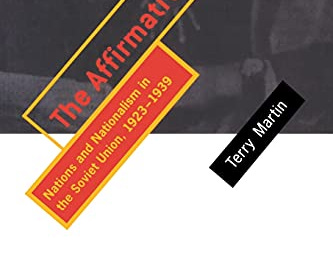Every time I try to sit down to write about my family’s early Soviet history, I keep getting derailed by some new book or reading I find or some recs sent over by friends and readers. The history of nationalism and national identity, especially how it played out a century or so ago in Eastern Europe and the Russian Empire, is still fairly new territory for me. There’s lot I don’t know and lot of rabbit holes to go down. But I’m guessing the effort will pay off at some point when I finally do sit down and write this thing.
One great book that was just recommended to me by my colleague Àngel Ferrero looks like a particularly good one. It’s called The Affirmative Action Empire and it’s by Terry Martin, who I think is over at Harvard. I just started reading it and I get the sense that it’ll help answer some questions that I’ve always had about the Soviet Union’s schizoid relationship with nationalism. One thing I could never really understand was why the state so heavily supported various different nationalisms in the beginning, but then waged a war on them, all while making nationality a major part of its citizens’ official identity?
It looks like the book will get to the root of that question. In short, Lenin and Stalin always had conflicted view of nationalism. First and foremost, they saw it in terms of strategy. They thought they could appeal to nationalist identity and use a kind of socialist nationalism to undermine the more reactionary types of nationalisms that were being deployed by capitalist forces at the periphery of the Russian Empire. But they still saw nationalism as something bad, but something that would eventually be melted down in a natural process of assimilation into a sort of uniform internationalist socialist mass culture. That was definitely the sense that I got from reading some of Lenin’s early writings on nationalism, especially from his time feuding with the Bund. Trotsky also had similar views.
Obviously, it didn’t work out that way Lenin intended. Nationalism and nationalist identity remained in the Soviet Union. And despite the fact that a uniform Soviet culture and identity was indeed forged, reactionary nationalism got the upper hand. It returned with a vengeance, growing stronger as Soviet ideology grew weaker and weaker. And of course the Cold Warrior Brain Bugs of the United States correctly saw multiculturalism and nationalism as major Soviet weaknesses and did their best to weaponize it to their own ends. I’ve written about that quite a bit. And Evgenia and I talked about it on one of our episodes.


